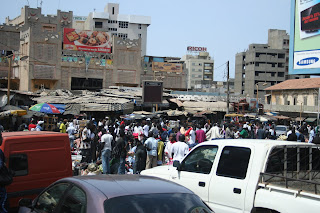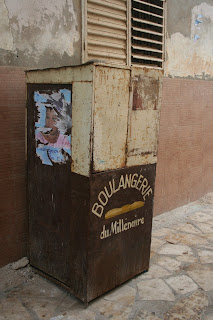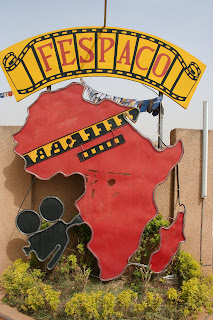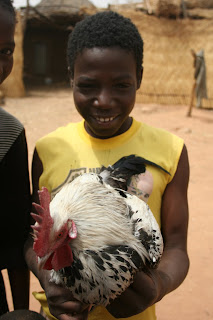
I was staying in a hotel on one side, with my office on the other. Every morning I'd cross the river, past a huge, ornate building nestled on one side of the river bank which is going to be the new Parliament building if it ever gets finished. It's being funded by Gaddaffi whose mother is Malian apparently, so he pumps large sums of funding into the country each year.

Bamako has a relaxed, small-town feel. The sort of place you can feel at home in very quickly and where it's easy to just spend time bantering with people. To be honest I didn't see much of it though as work was a bit intense.

I arrived just after Independece day so there were Malian flags everywhere
I did manage to make it to the market on my last day though. One of my colleagues had given me the name of a shop that sells bazin the very colourful, shiny material that makes boubous which is really popular in Senegal but imported from Mali so much cheaper there (about £35 for the minimum 4metres you need, compared to about £70 in Dakar). I took a taxi there but he didn't really speak French and do I don't think he really understood me. Well, actually I know he didn't understand me as I definitely didn't end up where I wanted to be! Still, he did take me to a shop in the market with gorgeous wax material (the traditional West African patterned print). Wax is not so fashionable in Dakar so it's hard to get a good selection. I felt like a kid in a sweetie shop. There were no windows, just colourful material hanging in cuts of 6 yards; row upon row of material, covering every inch of the walls. So much choice. I only intended to buy one or two but an hour and a half later I left with a stack of 8 pagnes, probably weighing about 5kg, and a very light purse.
I then had to negotiate my way along the narrow market streets, sharing the way with battered taxis squeezing between the vendors' stalls. The ground had turned a deep, muddy red with the cars churning up the sandy floor. Squelching through the mud and trying to avoid the big, red puddles was not ideal in sandals. When will I learn? Still, I eventually made it to the bazin shop. Totally not what I was expecting. A really big room with a huge counter and only a few piles of coloured bazin in a glass cabinet behind the counter. A different world from the previous place. Along the counter, was a huge roll of white bazin which seemed to be the only thing selling. I asked why there were so few colours to choose from and was told that everyone buys the white material and then takes it to their own dyer (a bit like going to the tailor) where they have it dyed (and subsequently bashed with a big wooden mallet to make it shine) to the colour of choice. I opted for a classic dark blue and am very excited about having my first bazin boubou made for Tabaski (the second Eid - 2 months after end of Ramadan). Armed with bazin for me and half my office, and my huge stack of wax I eventually made it back to the hotel and by some miracle squeezed it all into my case. Good work.

I loved this statue which I passed every day on the way to work.

















































